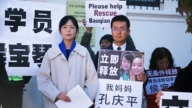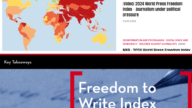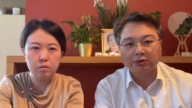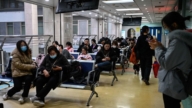【新唐人2011年9月17日讯】清华大学法学院女研究生李燕,申请中央各部委公开副部长的分工职责,但有三个部委拒绝公开。一周前,李燕将三部委告上法院,指控它们侵害公民的知情权与监督权。评论指出,这不仅仅是一个女生和三部委之间的较量,而是觉醒的公民权利与傲慢的政府权力之间的较量。
《新京报》报导,清华大学法学院女研究生李燕,要写一篇关于各部委副部长职责分工的论文,从今年(2011年)5月中旬开始向14个部委申请,公开各部委副部长或副主任的分管部门、职责范围等情况。
李燕认为,副部长拥有较大的权力,对他们的研究,有利于更好的认识政府行政部门的职能状况。但有些部门提出延长答复时间,而国土资源部、教育部和科技部则找理由拒绝公开信息。
其中,国土资源部回应说,可以通过官方网站查询,但实际上,网站上面并没有职责分工等信息。科技部答复,各副部长的分工由内部协调机制确定,是不断变化的,没有固定分工。教育部则宣称是内部管理信息,与李燕的“特殊需要”无关。
山东大学退休教授孙文广对《新唐人》表示,三部委拒绝公开这些信息,是违反“政务公开”的相关法律条例。
孙文广:“她(李燕)这个要求是合理的。因为,每一个部的副部长当然有分工啊,那么,有什么工作、有什么事情要找他的话,可以对口的去找,所以对于一般的公民,有这个权利去问这个部的副部长的分工情况。”
学习行政法的李燕告诉《新京报》记者,副部长的分工本来不该是敏感信息,但申请过程却很不顺利。李燕质疑,副部长这么重要的官员,他们的职权分工是最基本的信息,如果连这都不知道,如何行使公民的监督权?
在巨大的民怨压力之下,早在3年前,当局公布了《政府信息公开条例》。上个月(8月份),最高法院还曾经出台一个新规定,对于所谓“信息不公开”的政府机关,公民、法人或者其他组织可以依法提起诉讼。
李燕起诉三部委,是最高法这个新规定出台后,第一个走入公众视野的相关案件。大陆媒体和网民对李燕的维权行为非常关注与赞赏。
《中国网》《观点中国》栏目接连发表 “信息公开,不是’特殊需要’”“副部长分工是国家机密吗?”“职责不公开,民众咋监督” 等文章,并指出,这“不止是’一个女生’与’三家部委’的较量揭开” ,而是觉醒的公民权利与傲慢的公共权力之间的较量。
孙文广教授:“李燕她这个追下去呀,还是很有意义的。让我们看一下,到底政府一些部门,’政务公开是真的还是假的。另外,也可以看看,法院是不是真正的秉公执法、依法办案。”
两年前,河南南阳市民王清向全市181个政府部门申请公开“三公”消费,被当成刺探情报的间谍。
而李燕在申请过程中,也被有关部门怀疑“动机不纯”,甚至对她的“身份”特意进行核实。还有人号称:李燕是在借机炒作自己,不出名找不到工作。
孙文广教授:“她的维权是合理的、合法的,那么她就应该去做。至于是不是炒作自己,在中国这个社会,炒作自己是很难的。因为你(李燕)现在这种做法可能会得罪一些人哪,得罪一些法院的,得罪这些部门的,将来找工作可能还难一点。”
孙文广教授还指出,在中国,面对当局的欺压与不公,老百姓应该尽力去争取作为一个公民应有的权利。
孙文广教授:“有一个学生(李燕),她起来维护自己的权利,进行抗争,这个是难得的。我作为一个在大学里工作多年的教师来讲,我觉得应该鼓励她。”
李燕9号向市一中院递交了三份起诉书,对国土资源部、教育部及科技部提起行政诉讼。据媒体报导,李燕目前还在等待法院是否予以立案的答复。 16号下午,微博网友韩冬岩发布消息说:因为李燕把信息公开了,法院不给立案。但这条信息稍后被删除。
新唐人记者陈汉、李谦、萧宇采访报导。
Li Yan, a female graduate student from Tsinghua University’s
law school, applied for permission to publicize the job duties
of the deputy ministers in various ministries.
However, three ministries refused to disclose the information.
A week ago, Li Yan took these 3 ministries to court,
accusing them of infringement of citizen’s rights to know and
to supervise their government.
Analysts pointed out that this was not only a contest between
a girl and the 3 ministries, but also the contest
between the citizen’s becoming aware of their rights
and the government’s arrogance and power.
Beijing News reported that Li Yan, a female graduate student
from Tsinghua University’s Law School, would write a paper
on the work responsibilities of central ministries.
In mid-May of this year, she applied to the 14 ministries
for publicizing the information of deputy ministers or directors’
responsibilities and which departments are under their charge.
Li Yan thought that the deputy ministers had great power,
so the research on them would help understand the functions
of administrative departments in the government.
Some ministries said they needed more time to reply,
but the Ministry of Land Resources, Ministry of Education, and
Ministry of Science and Technology were looking for reasons
to refuse to publicize their information.
Among them, the Ministry of Land Resources responded that
the information could be searched through the official website.
In fact, no info on work responsibilities was on the website.
The Ministry of Science and Technology replied that
the deputy minister’s work responsibilities were decided by
internal coordination mechanism, which changes constantly.
There was no fixed work division for deputy ministers.
The Ministry of Education claimed that the information
requested belonged to the internal management,
and had nothing to do with Li Yan’s “special needs."
Sun Wenguang, a retired professor from Shandong University,
said to NTDTV that the 3 ministries’ refusal of publicizing
this information was violating the relevant laws and
regulations of an “open government."
Sun Wenguang: “Li Yan’s request is reasonable, as there are
work divisions for the deputy minister in each ministry.
For a certain work, people need to look for the related
deputy minister. Therefore, the citizens have the right to ask
about the deputy minister’s work responsibilities.”
Li Yan, who majors in administrative law, told the reporter of
Beijing News that, in fact, the deputy minister’s work duties
were not sensitive information.
But the process of her application was very unsmooth.
Li Yan questioned that with such important officials
as deputy ministers, their work responsibilities should be
basic information to access.
If even this remains unknown, how can the citizens
exercise their rights of supervision?
Under huge public pressure, 3 years ago, the authorities
announced regulations for accessing government information.
In August 2011, the Supreme Court issued a new regulation.
For the governmental agencies that refuse to make info open,
citizens, legal persons or other organizations
can bring them to court.
Li Yan’s lawsuit against the 3 ministries is the first related case
that which gets public attention after the Supreme Court order.
Media and netizens in China are showing great attention and
appreciation to Li Yan’s action in defending civil rights.
“China Network”, “China View” published a series of articles,
such as “Information disclosure is not ‘Special Needs’,"
“Is Deputy Minister’s work division a state secret?"
“If the responsibility is not open, how could people supervise."
They also pointed out that it’s “not only one girl’s struggle
with 3 ministries," but also the struggle between the citizen’s
awakening to their rights and the government’s arrogant power.
Sun Wenguang: “It makes sense for Li Yan to take this further.
Let’s see whether it’s true or false to have ‘open government’
in some departments. In addition, people will see if the courts
really enforce the law justly and deal with this case by law.
Two years ago, Wang Qing, a citizen from Nanyang, Henan,
asked the city to publicize the information on the taxpayers’
money spent on their non-businesses activities in the city’s
181 departments. He was treated as a spy gathering intelligence.
In the process of Li Yan’s application, some departments
suspected of “her impure motives.”
Some even conducted special verification of her “identity."
Some claimed that Li Yan was trying to get famous,
so that she was able to find a job.
Sun Wenguang: “Defending her rights is reasonable and
legitimate, so she should do it.
As for whether she is hype, in the Chinese society, it’s difficult
to do this, because her (Li Yan’s) action like this
could offend some persons, offend the courts,
which will make it harder to find a job.”
Professor Sun Wenguang also pointed out that in China,
facing the government’s oppression and injustice,
people should try to fight for their deserved rights as a citizen.
Sun Wenguang: “A student like Li Yan stands up to fight for
their rights. Such an action is precious.
As a teacher who taught many years in the university,
I think I ought to endorse her action.”
On Sept. 9, Li Yan handed in 3 bills to the first middle court,
charging the Ministries of Land Resources, Education and
Science & Technology with violating the transparency laws.
According to media reports, Li Yan is now waiting for court
to decide whether the case is accepted or denied.
On the afternoon of Sept. 16, Han Dong, a microblogging user,
said that because Li Yan made the information public,
the court would not register her case.
However, this message was later removed from the blog.
NTD reporters Chen Han, Li Qian and Xiao Yu































